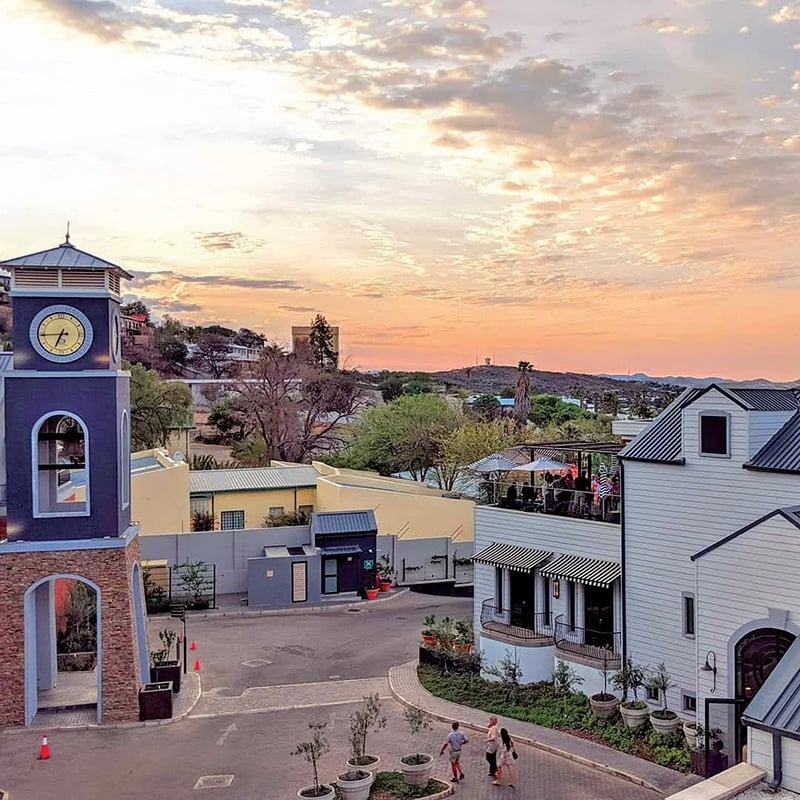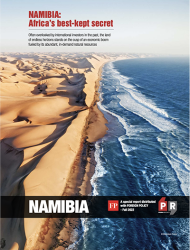Building a conducive framework for foreign direct investment
Committed to private-sector-led growth and attracting higher volumes of inward investment, the government has created a new central body that is making it easier to invest in the country

The stylish AM Weinberg hotel offers panoramic views of Windhoek city.
Namibia drew in robust inflows of foreign direct investment (FDI) from 2000 to 2015, a year when $888 million went into sectors like mining, financial services and manufacturing. When its economy slowed down from 2016, however, so did investor interest. “As a result, we decided to be more proactive in attracting FDI and, in 2021, we established the Namibia Investment Promotion and Development Board (NIPDB). It reports directly to President Geingob, which speaks volumes about the importance he attaches to FDI,” says Minister of Finance and Public Enterprises Ipumbu Shiimi. Tasked with promoting, advising on and facilitating investments, “NIPDB also has a clear mandate to improve Namibia’s competitiveness and ease of doing business,” reveals its CEO and chairperson Nangula Uaandja. There are already many reasons to invest in the country, she says: “Number one is safety, security and stability. The second is rule of law and the independence of our judiciary. Another is quality of life for investors and employees, thanks to the beauty of our country and great health, infrastructure and education systems, and a young, trainable workforce. Our government is also open to dialogue with investors.”

Then there is market access. Namibia’s membership of the Southern African Customs Union opens it up to about 70 million people, the Southern African Development Community contains 366 million and the African Continental Free Trade Area has over 1.3 billion. In addition, the African Growth and Opportunity Act and Economic Partnership Agreement with the European Union offer access to the U.S. and Europe. “When you look at Namibia, focus beyond its 2.5 million population, the opportunities are limitless,” Uaandja stresses. As she admits, “There are some bottlenecks for investors, but we’re dealing with them. We have a policy gap, so we’re working on a Namibia Investment Promotion and Facilitation Bill.” Another issue is energy costs, which the government has addressed through legislation to encourage independent power producers.” A further challenge was bureaucratic processes, however, NIPDB will be establishing a one-stop center with all the major agencies that deliver services to investors and we’re also accelerating e-services. There’s a lot of work happening to create a conducive environment for investments as a conduit to achieving our national priorities,” says Uaandja.
For the CEO, some of the most exciting of those priorities at the moment are green hydrogen, the blue economy, agribusiness, tourism, the film industry, manufacturing and moving beyond extraction in mining toward value addition. “The outlook is very positive and we have a good pipeline of investment projects,” she states. Investor interest in Namibia is also on the up, with two delegations from the U.S. having visited this year, Uaandja adds. “At present, we export three main products to the U.S. “” beef, green charcoal and beer ” but we’d like to produce more goods for U.S firms that want to diversify their supply sources.” That wish is likely to be granted, according to the U.S. Embassy in Namibia’s chargé d’affaires, Jessica Long: “The U.S. government prioritizes creating jobs in Namibia through growing Namibian exports to the U.S. and other countries, increasing U.S. investment in Namibia and supporting Namibian entrepreneurs. The U.S. is a proud partner of the private sector in Namibia.” Mercia Geises, CEO at Standard Bank Namibia, one of the country’s top-three banks, is impressed by the improvements that have been made to the investment climate. “We’ve done a lot as a country to change the strategic direction of Namibia, enhancing governance, efficiencies and crafting policies that attract confidence and investments. Namibia is a very attractive investment destination and its banks are here to help investors navigate the country’s dynamics.” Marco Raffinetti, CEO of Hyphen Hydrogen Energy, an international joint venture that has recently won a $9.4-billion tender for a huge green-hydrogen generation project, is equally enthusiastic. “Namibia is among the most stable and well-governed countries in Africa, and is highly committed to creating legal, regulatory, fiscal and commercial frameworks for industry that are transparent, equitable and value accretive for Namibia and its people,” he asserts.
Report Contents

 Download the PDF
Download the PDF